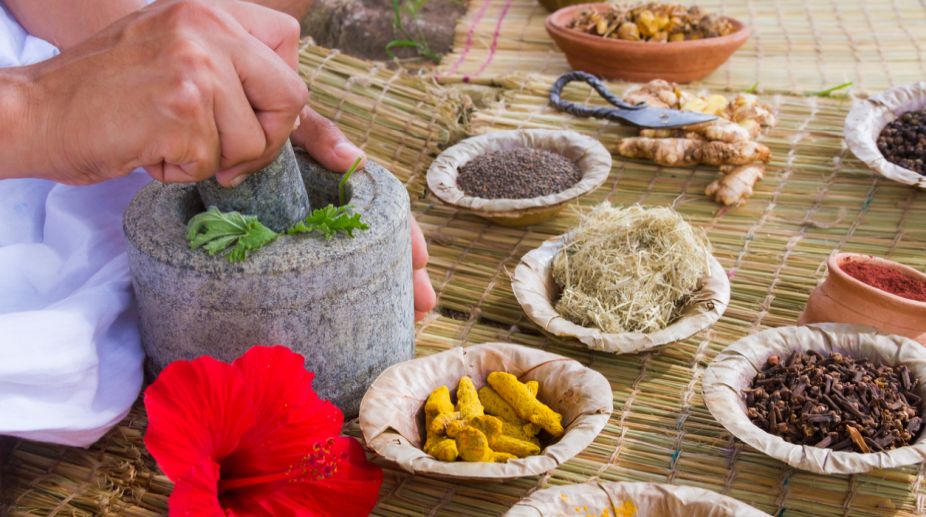Patanjali foot care: DIY Ayurvedic solutions
Discover effective DIY Ayurvedic foot care solutions from Patanjali for revitalized, healthy feet. Explore natural remedies and products for soft, supple soles.

Representational Image (Photo: Getty Images)
The All India Institute of Ayurveda was inaugurated in the national capital by Prime Minister Narendra Modi on 17 October to coincide with Ayurveda Day. The institute has begun for Ayurvedic medicine and it showcases clinical facilities in the hospital block, which has 200 referral beds, and includes neurological and degenerative disease care units with rheumatology, musculoskeletal care, metabolic and allergic units and investigative facilities.
It has already established pathology, biochemistry, microbiology and radiology laboratories with diagnostic facilities. This newly developed centre will function as a parallel to the All India Institute of Medical Sciences. Before we delve into Ayurveda’s long association with mankind, we must pay heed to Rene Descartes (1596- 1650), a French philosopher and scientist, known as the father of modern Western philosophy. He articulates the principal rules, which must be adhered to, when studying and propagating any segment of science.
The same principles of Descartes will also apply to AIIA’s endeavours, where this newly founded institute will be conducting research on Ayurveda’s many treatments. They will need to assimilate these relevant rules, prescribed and simplified by this French philosopher. Descartes cautions, never to accept anything for true, which is perceived to be unclear, and progress into the study by avoiding prejudice. That excludes any room for doubt. Divide each of the difficulties, which are under examination, into as many parts or segments as possible.
Advertisement
One should commence with objects that are the simplest and easiest to know and then ascend step by step to more complex knowledge. Eventually, concludes Descartes, it should be the endeavour, in every case, to make enumerations so complete and reviews so general that one is assured nothing is omitted. Descartes has explained these fundamental precepts, which will enable a scientist to finally arrive at a logical conclusion.
Ayurveda is as old as life itself, and with the survival of species and the appearance of disease, there certainly would have evolved the means to combat the same. As Charles Darwin had said, “Man with his God like intellect,” would have invented the scope of the search of remedies. If we discount the myth of the Bible’s Garden of Eden, which man had to abandon because of a sin, the many illnesses that must have afflicted him from his birth, would have elucidated the dawn of disease and with it the peremptory need for remedies — to cure or at least subdue an illness.
All societies from pristine times had a collection of remedies, which would have evolved through trial and error methods or simply by “accident”. As late as the 17th century, Moliere referred to physicians as people “who poured medicines of which they know little” into “bodies of which they know less.” The practice of trial and error obviously continued to a lesser or greater extent even in the 17th century. References to medicine are found in the earliest texts where the Vedas describe ancient India during the Buddhist period, when monks travelled all over the country, not only preaching Buddhism, but also curing those who were suffering from illnesses.
Professor V Narayanaswamy, from the College of Indian Medicine, Chennai, explains that fundamentals of the Ayurvedic system of medicine is essentially applicable to all times and ages and does not change from one era to another. He writes, “Human factors and civilisations may change, the environment could change, human habits may change but humanity with its physiology has remained constant. This factor on its own has enabled a steady form of Ayurvedic medication over the ages.”
To appreciate Narayanaswamy’s profound thoughts, on the unchanging impact of Ayurveda, one must know the intrinsic composition of this form of medication. Ayurvedic medicine comprises either herbs or a combination of herbs and minerals in a practice termed Rasa Shastra. Ayurveda is composed of two words of Sanskrit — Ayur meaning life and Veda meaning knowledge. Ayurvedic practitioners, unlike their counterparts, first consider the three doshas. The first one is vata, which is in charge of mobility, circulation, breathing and essential body functions. The second is pitta— the energy, which governs metabolic activity like digestion, absorption of nutrients, body temperature and energy.
And finally kaphathat controls growth in the body and supplies moisture to cells and organs; also maintains a strong immune system. Ayurveda’s aim is to maintain a dosha equilibrium because treatment considers individuality when prescribing medication, unlike other types of medication. Incredible as it may be, the focus on individuality has evolved in recent times, to be followed in another form of medication, which is termed precision medication and focuses on an individual’s gene, to check which ailment they may be susceptible to.
The medical world has been inspired by Ayurveda’s precept of studying a patient’s individuality first before treatment. For example with an individual who has the gene TCF7L2 associated with diabetes, precision medication protects them with specific treatment for the same.
We can understand why Ayurvedic medication, with its combination of herbs has survived as a distinct entity from remote antiquity to the present day. We return to nature’s bounty which has, for thousands of years, created different types of cures, enunciating William Wordsworth’s lines, “Come forth into the light of things, Let nature be your teacher.”
Advertisement